Leading China Conveyor Belt for Stone Crusher Factory
Conveyor belts play a crucial role in stone crusher factories, ensuring efficient material handling and processing. The seamless transport of raw materials like stones and ores significantly enhances productivity and operational efficiency. This blog post delves into the significance of high-quality conveyor belts and highlights key features and specifications that make them indispensable in stone crusher operations. We’ll explore the leading manufacturers and the variety of conveyor belts available in the market. Leading China Conveyor Belt for Stone Crusher Factory – Durable, high-capacity conveyor belts for efficient bulk material handling. By understanding the importance of selecting the right china conveyor belt for stone crusher factory, businesses can improve their production capabilities and ensure smooth operations.
Why Conveyor Belts are Essential in China Conveyor Belt for Stone Crusher Factory
In the dynamic environment of a stone crusher factory, the continuous movement of materials is fundamental to operational efficiency. The use of conveyor belts is indispensable, ensuring seamless and effective handling of materials. This section explores the essential roles that conveyor belts play in stone crusher operations, particularly in the context of a china conveyor belt for stone crusher factory, and delves into the numerous benefits they offer, from efficiency to safety.
Roles of Conveyor Belts in Stone Crusher Operations
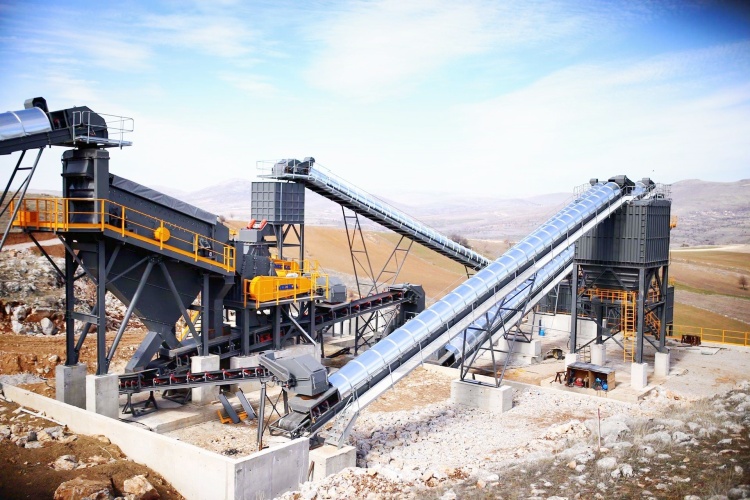
- Material Transportation:
Conveyor belts facilitate the transportation of raw materials such as rocks, stones, and minerals from one part of the factory to another. This movement is critical as it ensures that materials are consistently fed into the crushers for processing. - Efficient Loading and Unloading:
They provide a streamlined system for loading and unloading materials, minimizing manual handling and reducing labor costs. This efficiency is particularly vital in high-volume operations typical of stone crusher factories. - Reduction of Human Error:
Automated conveyor systems reduce the likelihood of human error. Manual transportation can lead to material spillage, incorrect handling, and safety risks, all of which are mitigated by a reliable conveyor belt system. - Increased Production Capacity:
Conveyor belts significantly boost production capacity by ensuring a constant and regulated flow of materials. This steady supply enables crushers to operate at optimal levels, increasing overall output. - Consistent Quality Control:
By maintaining a uniform flow of materials, conveyor belts help in maintaining consistent quality. They ensure that the material is delivered at a constant rate, allowing for better quality control during the crushing process. - Energy Efficiency:
Conveyor belts are designed to be energy efficient. By using electric motors that optimize power consumption, they contribute to reducing the overall energy costs in a stone crusher factory. - Customizable Length and Speed:
The adaptability of conveyor belts to various lengths and speeds makes them ideal for diverse operational needs. Whether transporting materials over short distances or across extensive factory floors, they can be customized to meet specific requirements. - Space Optimization:
Conveyor belts contribute to the effective utilization of space within a factory. They can be designed to navigate complex layouts, including inclines and declines, ensuring that every inch of the factory floor is utilized efficiently. - Automation Integration:
Modern conveyor belts can be integrated with advanced automation systems. This integration allows for real-time monitoring and control, enhancing operational efficiency and allowing for prompt responses to any issues. - Reduced Maintenance Downtime:
High-quality conveyor belts are designed for durability and longevity. Their robust construction means less frequent maintenance, minimizing downtime and ensuring continuous operation.
Benefits of Using Conveyor Belts (Efficiency, Cost-Effectiveness, Safety)
- Operational Efficiency:
The most significant advantage of using conveyor belts is the marked improvement in operational efficiency. By automating the movement of materials, conveyor belts ensure that operations run smoothly and continuously, which is crucial for maintaining productivity levels in a china conveyor belt for stone crusher factory. - Cost-Effectiveness:
Conveyor belts offer substantial cost savings. They reduce the need for manual labor, decrease material handling costs, and lower the likelihood of damage to materials, all of which contribute to overall cost reduction. - Enhanced Safety:
Safety is a paramount concern in stone crusher operations. Conveyor belts enhance safety by reducing the need for manual material handling, which can be hazardous. By automating the transport of heavy and bulky materials, the risk of accidents and injuries is significantly reduced. - Time Savings:
Conveyor belts drastically cut down the time required to move materials. This time-saving aspect is crucial in high-demand environments where every second counts. Faster material movement means quicker processing times and increased throughput. - Versatility:
The versatility of conveyor belts is another key benefit. They can handle a wide range of materials, from small stones to large rocks, and are suitable for various stages of the stone crushing process, including feeding, conveying, and discharging. - Improved Workflow:
Conveyor belts contribute to a more organized and streamlined workflow. By ensuring that materials are moved efficiently through each stage of the crushing process, they help to eliminate bottlenecks and improve overall operational flow. - Environmental Benefits:
Conveyor belts can also offer environmental benefits. By optimizing material transport and reducing the reliance on diesel-powered vehicles for internal logistics, they help to lower greenhouse gas emissions and reduce the environmental footprint of the stone crusher factory. - Scalability:
As the demand for production increases, conveyor belts can be easily scaled to meet new requirements. Their modular nature allows for extensions and modifications, making it simple to adapt to changing production needs without significant investments.
Detailed Analysis of Conveyor Belt Roles and Benefits
Material Transportation
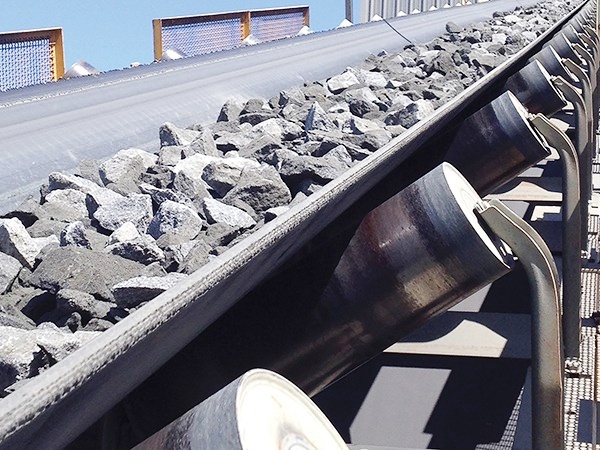
Efficient material transportation is at the heart of any stone crusher factory’s operation. Conveyor belts ensure that materials are moved quickly and reliably from one part of the plant to another. In a china conveyor belt for stone crusher factory, this process is streamlined to handle the high volumes of raw materials typically processed. The belts can transport materials over long distances and across various levels of the plant, including vertical and horizontal movements, which is essential for maintaining a continuous production flow.
Efficient Loading and Unloading
Conveyor belts are designed to facilitate efficient loading and unloading of materials. This efficiency is critical in preventing delays and ensuring that the crushers are constantly supplied with raw materials. Automated systems can precisely control the flow of materials, reducing the risk of overloading or underloading the crushers, which can lead to operational inefficiencies.
Reduction of Human Error
One of the key benefits of using conveyor belts in a china conveyor belt for stone crusher factory is the reduction of human error. Manual handling of materials is prone to mistakes, which can lead to material wastage, increased costs, and safety hazards. Automated conveyor belts eliminate these risks by providing a consistent and reliable means of transporting materials.
Increased Production Capacity
By ensuring a constant and regulated flow of materials, conveyor belts help to maximize production capacity. Crushers can operate at their optimal capacity without interruptions, leading to higher output levels. This is particularly important in high-demand environments where meeting production targets is crucial.
Consistent Quality Control
Maintaining consistent quality is a significant challenge in stone crushing operations. Conveyor belts play a vital role in this by ensuring that materials are delivered to the crushers at a constant rate. This uniformity helps in achieving consistent product quality, as the crushers can operate under stable conditions.
Energy Efficiency
Energy efficiency is a crucial consideration in any industrial operation. Conveyor belts are designed to use energy efficiently, with electric motors optimized for power consumption. This efficiency not only reduces energy costs but also contributes to the sustainability of the operation.
Customizable Length and Speed
The ability to customize the length and speed of conveyor belts makes them highly adaptable to different operational needs. Whether transporting materials over short distances or across large factory floors, conveyor belts can be tailored to meet specific requirements, ensuring optimal performance.
Space Optimization
Effective utilization of space is essential in a stone crusher factory. Conveyor belts can be designed to navigate complex layouts, including inclines and declines, ensuring that every part of the factory is used efficiently. This space optimization is crucial in maximizing production capacity and minimizing operational costs.
Automation Integration
Modern conveyor belts can be integrated with advanced automation systems, allowing for real-time monitoring and control. This integration enhances operational efficiency by providing instant feedback and enabling prompt responses to any issues that may arise. Automated systems can also optimize the flow of materials, further improving efficiency.
Reduced Maintenance Downtime
High-quality conveyor belts are designed for durability and longevity. Their robust construction means less frequent maintenance is required, minimizing downtime and ensuring continuous operation. This reliability is particularly important in a china conveyor belt for stone crusher factory, where any interruption in production can lead to significant losses.
Benefits of Using Conveyor Belts
Operational Efficiency
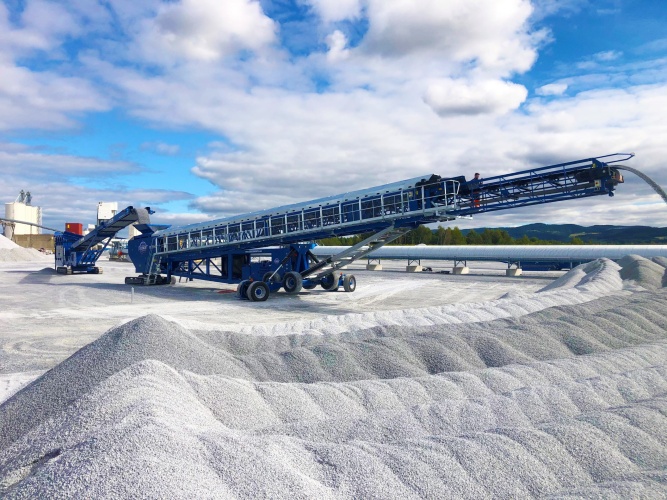
The primary benefit of using conveyor belts in stone crusher operations is the significant improvement in operational efficiency. Conveyor belts automate the transport of materials, ensuring that operations run smoothly and continuously. This automation is crucial for maintaining high productivity levels and meeting production targets.
Cost-Effectiveness
Conveyor belts offer substantial cost savings by reducing the need for manual labor and minimizing material handling costs. They also lower the likelihood of damage to materials, contributing to overall cost reduction. In a china conveyor belt for stone crusher factory, these savings can be significant, improving the profitability of the operation.
Enhanced Safety
Safety is a paramount concern in stone crusher operations. Conveyor belts enhance safety by reducing the need for manual material handling, which can be hazardous. Automated systems minimize the risk of accidents and injuries, ensuring a safer working environment.
Time Savings
Conveyor belts drastically cut down the time required to move materials. This time-saving aspect is crucial in high-demand environments where every second counts. Faster material movement means quicker processing times and increased throughput, allowing factories to meet their production targets more efficiently.
Versatility
The versatility of conveyor belts is another key benefit. They can handle a wide range of materials, from small stones to large rocks, and are suitable for various stages of the stone crushing process, including feeding, conveying, and discharging. This versatility makes them an indispensable part of any stone crusher factory.
Improved Workflow
Conveyor belts contribute to a more organized and streamlined workflow. By ensuring that materials are moved efficiently through each stage of the crushing process, they help to eliminate bottlenecks and improve overall operational flow. This improved workflow is crucial for maintaining high productivity levels and meeting production targets.
Environmental Benefits
Conveyor belts can also offer environmental benefits by optimizing material transport and reducing the reliance on diesel-powered vehicles for internal logistics. This reduction in vehicle usage helps to lower greenhouse gas emissions and reduce the environmental footprint of the stone crusher factory, contributing to sustainability efforts.
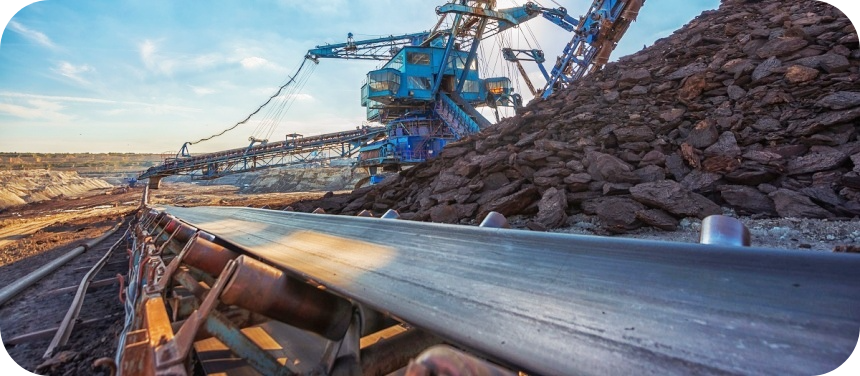
Scalability
As the demand for production increases, conveyor belts
can be easily scaled to meet new requirements. Their modular nature allows for extensions and modifications, making it simple to adapt to changing production needs without significant investments. This scalability is crucial for maintaining flexibility and responsiveness in a dynamic operational environment.
Conveyor belts are essential components in the efficient operation of stone crusher factories. Their roles in material transportation, loading and unloading, reducing human error, increasing production capacity, and ensuring consistent quality control are invaluable. The numerous benefits they offer, including improved operational efficiency, cost-effectiveness, enhanced safety, time savings, versatility, improved workflow, environmental benefits, and scalability, make them indispensable in any stone crusher operation. By understanding and leveraging the advantages of a china conveyor belt for stone crusher factory, businesses can enhance their production capabilities, improve operational efficiency, and achieve their production targets with greater ease and reliability.
Leading Manufacturers of China Conveyor Belt for Stone Crusher Factory
In the rapidly industrializing economy of China, the manufacturing sector plays a pivotal role, with the conveyor belt industry being a significant part of it. Conveyor belts are crucial for the mining and construction industries, particularly those used in stone crushers. This section delves into the leading manufacturers of stone crusher conveyor belts in China, exploring their manufacturing processes, quality standards, and overall contribution to the sector.
Prominent Manufacturers
China is home to several prominent manufacturers of stone crusher conveyor belts. These companies are known for their high-quality products, innovative manufacturing processes, and adherence to strict quality standards. The following are six of the most notable manufacturers in this industry:
Gram Conveyor
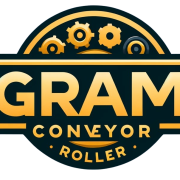
As an excellent China conveyor roller supplier and conveyor belt manufacturer, Our products mainly include the following three types: conveyor roller, a wide variety of conveyor belt, and different types of conveyor accessories/conveyor parts. We are a conveyor roller manufacturers that provides products of different materials and functions based on your needs among these three major product categories.
Hunan Sanliu Rubber Co.,Ltd.

Found in 1986, Hunan Sanliu Rubber Co.,Ltd., coming by the state-owned business re-manufacture, is appointed as a designated enterprise by the State Ministry of chemical industry, which specialized in the production of all types rubber v-belts.
Zhejiang Double Arrow Rubber Co., Ltd.

Zhejiang Double Arrow Rubber Co., Ltd. is another leading manufacturer in China. The company produces a wide range of conveyor belts designed for different applications, including those used in stone crushers. Double Arrow Rubber is known for its advanced manufacturing technology and rigorous quality control measures.
Baoding Huayue Rubber Belts Co., Ltd.
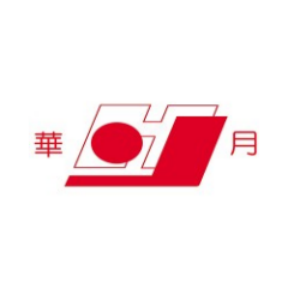
Baoding Huayue Rubber Belts Co., Ltd. is a leading manufacturer of conveyor belts in China. The company produces a variety of belts, catering to different industries such as mining, construction, and manufacturing. Huayue Rubber Belts is known for its stringent quality control processes and commitment to customer satisfaction.
Hebei Jiuzhou Rubber Technology Co., Ltd.

Hebei Jiuzhou Rubber Technology Co., Ltd. is a well-respected name in the conveyor belt industry. The company specializes in producing high-quality conveyor belts for stone crushers and other heavy-duty applications. Jiuzhou Rubber Technology places a strong emphasis on innovation and quality assurance.
Overview of the Manufacturing Process and Quality Standards
The manufacturing process of stone crusher conveyor belts involves several critical steps to ensure the production of high-quality and durable products. These steps include the selection of raw materials, processing, and quality control measures.
Raw Material Selection
The quality of raw materials is fundamental to the manufacturing of durable conveyor belts. Leading manufacturers in China source high-quality rubber and other materials to ensure their products can withstand the demanding conditions of stone crushing operations. The rubber used is typically a blend of natural and synthetic types, providing the necessary flexibility and strength.
Compounding and Mixing
Once the raw materials are selected, they undergo a compounding and mixing process. This step involves blending the rubber with various additives, such as fillers, plasticizers, and vulcanizing agents. The mixture is then homogenized to ensure a consistent composition, which is crucial for the performance and durability of the conveyor belts.
Calendaring
After mixing, the rubber compound is processed through a calendaring machine. Calendaring is a crucial step where the rubber compound is formed into sheets of uniform thickness. These sheets form the base of the conveyor belt and are critical for ensuring even tension and load distribution during operation.
Belt Formation
The next step is the formation of the conveyor belt. This process involves layering the calendared sheets with other materials, such as fabric or steel cords, to provide additional strength and support. The layers are then bonded together under high pressure and temperature to create a single, cohesive belt.
Vulcanization
Vulcanization is a key process in the production of conveyor belts. It involves heating the belt to a specific temperature to initiate a chemical reaction that strengthens the rubber. This process enhances the elasticity, durability, and heat resistance of the conveyor belts, making them suitable for the harsh conditions of stone crushing operations.
Quality Control
Quality control is an integral part of the manufacturing process for stone crusher conveyor belts. Leading manufacturers in China implement rigorous quality control measures to ensure their products meet international standards. These measures include:
- Visual Inspection: Inspecting the belts for any visible defects or inconsistencies.
- Dimensional Checks: Ensuring the belts meet the required dimensions and specifications.
- Tensile Testing: Testing the strength and elasticity of the belts to ensure they can withstand the necessary loads.
- Aging Tests: Simulating long-term use to assess the durability and performance of the belts over time.
- Abrasion Resistance: Testing the belts for their ability to resist wear and tear during operation.
Packaging and Distribution
Once the conveyor belts pass all quality control checks, they are prepared for packaging and distribution. Proper packaging is essential to protect the belts during transportation and storage. Leading manufacturers use robust packaging materials and methods to ensure their products reach customers in optimal condition.
China’s conveyor belt manufacturing industry, particularly for stone crushers, is characterized by innovation, quality, and efficiency. Leading manufacturers like XinRiSheng, Zhejiang Double Arrow Rubber Co., Ltd., and Qingdao Rubber Six Conveyor Belt Co., Ltd. are at the forefront of this industry, producing high-performance conveyor belts that meet the demanding needs of the mining and construction sectors.
The manufacturing process of these conveyor belts involves several critical steps, from raw material selection to vulcanization and quality control. Each step is meticulously managed to ensure the production of durable and reliable conveyor belts that can withstand the harsh conditions of stone crushing operations.
By adhering to stringent quality standards and continuously investing in research and development, these manufacturers contribute significantly to the global supply of conveyor belts, ensuring that industries around the world have access to high-quality products that enhance their operational efficiency and productivity.
The china conveyor belt for stone crusher factory sector is robust and dynamic, driven by leading manufacturers who prioritize quality and innovation. Their commitment to excellence ensures that their products remain competitive in the global market, meeting the evolving needs of industries that rely on conveyor belts for their operations.
Key Features of High-Quality Conveyor Belts for Stone Crushers
In the stone crusher industry, conveyor belts are essential components that must withstand the harsh conditions of the working environment. High-quality conveyor belts are designed to offer specific features and properties that ensure optimal performance and longevity. This section provides a detailed look at the key features of high-quality conveyor belts for stone crushers, including their resistance to oil, acid, and alkali, as well as their tensile strength and durability.
Detailed Look at Features
Oil Resistance
High-quality conveyor belts for stone crushers are designed to be oil-resistant, ensuring they can withstand exposure to oils and greases commonly found in industrial environments. This feature is essential for maintaining the integrity and longevity of the belt, even when exposed to harsh substances.
Acid and Alkali Resistance
Conveyor belts used in stone crusher factories must also be resistant to acids and alkalis, as these substances can cause significant damage to the belt over time. High-quality belts are designed to withstand exposure to these chemicals, ensuring they remain in optimal condition for longer periods.
Tear Resistance
Tear resistance is a crucial feature of conveyor belts for stone crushers, as the belts are subjected to high levels of stress and strain during operation. High-quality belts are engineered to resist tearing, ensuring they can withstand the rigors of the working environment without failing.
Heat Resistance
Stone crusher conveyor belts must also be heat-resistant, as they are often exposed to high temperatures during operation. Heat-resistant belts are designed to maintain their integrity and strength even when exposed to extreme heat, ensuring they can continue to perform reliably in demanding conditions.
Cold Resistance
In addition to heat resistance, conveyor belts for stone crushers must also be cold-resistant, as they may be exposed to low temperatures during operation. Cold-resistant belts are designed to remain flexible and functional even in freezing conditions, ensuring they can continue to operate effectively in all environments.
Wear Resistance
Wear resistance is another essential feature of conveyor belts for stone crushers, as the belts are constantly in contact with abrasive materials. High-quality belts are engineered to resist wear, ensuring they can withstand the abrasive effects of the materials they transport, prolonging their lifespan.
Importance of Tensile Strength and Durability
Tensile strength is a critical factor in the performance of conveyor belts for stone crushers. High tensile strength ensures that the belt can withstand the forces exerted on it during operation, preventing failure and downtime. Additionally, durability is essential, as the belts must be able to withstand the rigors of daily use in a stone crusher factory without succumbing to wear and tear.
Certifications and Standards
High-quality conveyor belts for stone crushers are often certified to meet international standards such as ISO9001, ISO14001, SGS, and BV. These certifications ensure that the belts have been manufactured to the highest quality standards and are suitable for use in demanding industrial environments. Certification provides peace of mind to customers, knowing that they are purchasing a reliable and high-quality product.
High-quality conveyor belts for stone crushers are designed with specific features and properties to ensure optimal performance and longevity in the demanding conditions of stone crusher factories. Features such as oil resistance, acid and alkali resistance, tear resistance, heat resistance, cold resistance, and wear resistance are essential for ensuring the belt can withstand the rigors of the working environment. Additionally, tensile strength and durability are crucial factors in the performance of conveyor belts, ensuring they can withstand the forces exerted on them during operation. Certifications and standards such as ISO9001, ISO14001, SGS, and BV provide assurance of the quality and reliability of the belts, giving customers peace of mind when purchasing.
Contact us for efficient and durable conveyor belts.
Types of China Conveyor Belt for Stone Crusher Factory
Conveyor belts are indispensable components in stone crusher factories, facilitating the movement of materials and enhancing productivity. This section provides a comprehensive overview of the different types of conveyor belts commonly used in stone crusher factories, including EP, NN, heat-resistant, oil-resistant, steel cord, and chevron belts. Each type is discussed in detail, highlighting its applications and advantages.
Overview of Different Types of Conveyor Belts
| Type | Description |
|---|---|
| EP (Polyester) | EP conveyor belts are composed of polyester in the warp and nylon in the weft, offering high tensile strength and excellent flexibility. |
| NN (Nylon) | NN conveyor belts consist of nylon in both the warp and weft, providing exceptional tensile strength and excellent troughability. |
| Heat-Resistant | Heat-resistant conveyor belts are designed with a special rubber compound for high adhesive strength and excellent thermal protection. |
| Oil-Resistant | Oil-resistant conveyor belts feature a special compound for materials coated with oil or grease, offering resistance to various types of oils. |
| Steel Cord | Steel cord conveyor belts are characterized by high strength, less elongation, and wear resistance, making them ideal for demanding applications. |
| Chevron | Chevron conveyor belts are suitable for conveying loose, bulky, or bagged materials on inclined surfaces at angles of less than 40 degrees. |
Applications and Advantages of Each Type
EP (Polyester) Conveyor Belts
EP conveyor belts are widely used in stone crusher factories for their high tensile strength and excellent flexibility. They are suitable for conveying materials with moderate abrasiveness and are ideal for applications where flexibility is essential.
NN (Nylon) Conveyor Belts
NN conveyor belts are preferred in stone crusher factories for their exceptional tensile strength and excellent troughability. They are suitable for conveying heavy-duty materials with high impact resistance and are ideal for applications requiring durability and reliability.
Heat-Resistant Conveyor Belts
Heat-resistant conveyor belts are essential for stone crusher factories operating in high-temperature environments. They are designed to withstand constant temperatures of up to 200°C and short runs up to 250°C, making them suitable for conveying materials at elevated temperatures.
Oil-Resistant Conveyor Belts
Oil-resistant conveyor belts are crucial for stone crusher factories dealing with materials coated with oil or grease. They are available in different grades for various types of oils, ensuring reliable performance and longevity in challenging environments.
Steel Cord Conveyor Belts
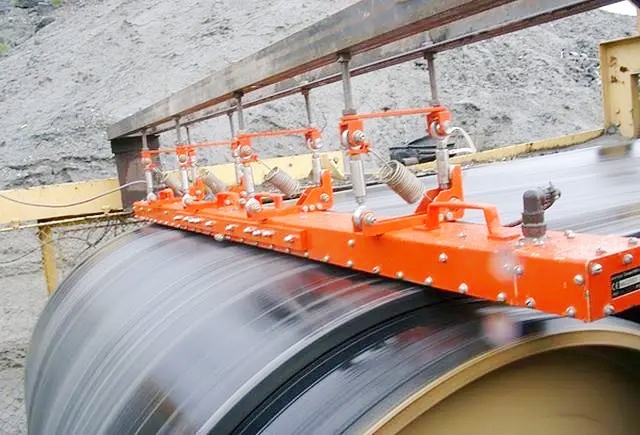
Steel cord conveyor belts are commonly used in stone crusher factories requiring high strength and durability. They offer less elongation, high tensile strength, and excellent wear resistance, making them ideal for demanding applications such as coal mining.
Chevron Conveyor Belts
Chevron conveyor belts are ideal for conveying loose, bulky, or bagged materials on inclined surfaces at angles of less than 40 degrees. They feature cleats on the surface to prevent material rollback and are suitable for applications requiring efficient material handling on steep inclines.
In conclusion, various types of conveyor belts are available for stone crusher factories, each offering unique advantages and suitability for specific applications. From EP and NN belts to heat-resistant, oil-resistant, steel cord, and chevron belts, there is a wide range of options to choose from based on the requirements of the operation. Understanding the applications and advantages of each type can help stone crusher operators make informed decisions when selecting conveyor belts for their factories.
Specifications to Consider: China Conveyor Belt for Stone Crusher Factory
Choosing the right conveyor belt for a stone crusher factory is crucial to ensure optimal performance and efficiency. This section highlights the key specifications that should be considered when selecting a conveyor belt, including belt width, ply thickness, and tensile strength. Additionally, it provides guidance on how to choose the right belt for specific needs, ensuring that the conveyor belt meets the requirements of the stone crusher operation.
Important Specifications
Belt Width
The belt width is an essential specification to consider when choosing a conveyor belt for a stone crusher factory. The width of the belt should be selected based on the size of the material being transported and the capacity requirements of the crusher. A wider belt can accommodate larger materials and higher capacities, while a narrower belt may be more suitable for smaller materials and lower capacities.
Ply Thickness
The ply thickness refers to the number of layers of fabric in the belt. Conveyor belts for stone crushers typically have multiple plies to provide strength and durability. The ply thickness should be selected based on the application requirements, with thicker plies offering greater strength and durability. However, it’s essential to balance ply thickness with flexibility to ensure smooth operation.
Tensile Strength
Tensile strength is a critical specification that indicates the maximum load a belt can withstand without breaking. It is crucial to choose a conveyor belt with adequate tensile strength to handle the demands of the stone crusher operation. The tensile strength should be selected based on the weight of the materials being transported and the operating conditions of the conveyor belt.
How to Choose the Right Belt for Specific Needs
Consider the Material Being Transported
The type of material being transported is a crucial factor in selecting the right conveyor belt. For example, if the material is abrasive or sharp-edged, a belt with high abrasion resistance is required. Similarly, if the material is oily or greasy, a belt with oil resistance is necessary. Considering the specific properties of the material will help determine the appropriate belt specifications.
Evaluate the Operating Conditions
The operating conditions of the conveyor belt, such as temperature, humidity, and exposure to chemicals, should also be taken into account. For example, if the conveyor belt will be exposed to high temperatures, a heat-resistant belt is required. Similarly, if the belt will be exposed to chemicals, a belt with chemical resistance is necessary. Evaluating the operating conditions will ensure that the belt can withstand the environment in which it will be used.
Determine the Required Capacity
The capacity requirements of the stone crusher operation should also be considered when choosing a conveyor belt. The belt should be able to handle the maximum capacity of materials that will be transported, ensuring smooth and efficient operation. It’s essential to select a belt with the appropriate width and ply thickness to meet the capacity requirements of the operation.
Consult with a Conveyor Belt Expert
Finally, it’s recommended to consult with a conveyor belt expert when choosing a belt for a stone crusher factory. A conveyor belt expert can provide valuable insights and recommendations based on the specific needs of the operation. They can help select a belt that meets the requirements of the stone crusher operation and ensures optimal performance and efficiency.
Selecting the right conveyor belt for a stone crusher factory is crucial to ensure optimal performance and efficiency. Key specifications such as belt width, ply thickness, and tensile strength should be carefully considered when choosing a belt. Additionally, factors such as the material being transported, operating conditions, and capacity requirements should also be taken into account. By carefully evaluating these factors and consulting with a conveyor belt expert, you can choose a belt that meets the specific needs of your stone crusher operation.
Packaging and Delivery of China Conveyor Belt for Stone Crusher Factory
The packaging and delivery of conveyor belts for stone crusher factories are critical aspects that ensure the safe transportation and installation of the belts. This section explores the various packaging options available for conveyor belts, including rolls, pallets, and steel frames, as well as the logistics and considerations involved in the delivery process.
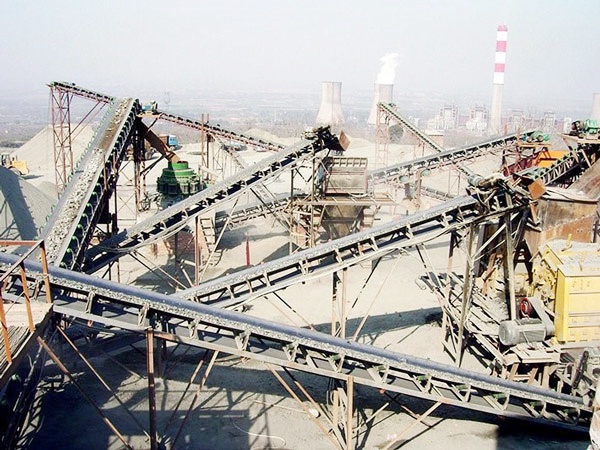
Packaging Options
Rolls
Conveyor belts for stone crushers are often packaged in rolls for easy handling and transportation. Roll packaging protects the belt from damage during transit and allows for convenient storage. The rolls are typically wrapped in protective material to prevent abrasion and ensure the belt remains in optimal condition.
Pallets
Pallet packaging is another common option for conveyor belts. The belts are placed on sturdy pallets and secured with straps or shrink wrap to prevent movement during transit. Pallet packaging is ideal for large belts or when multiple belts need to be transported together.
Steel Frames
For heavy-duty conveyor belts, steel frames are used for packaging. The belts are mounted on steel frames and secured with bolts or straps to ensure stability during transit. Steel frame packaging provides maximum protection for the belts and is suitable for long-distance transportation.
Delivery Logistics and Considerations
Transportation Modes
The transportation mode for conveyor belts depends on various factors, including the distance to be covered, the size and weight of the belts, and the delivery schedule. Common transportation modes include trucks, trains, and ships. Trucks are often used for short-distance deliveries, while trains and ships are used for long-distance transportation.
Handling and Unloading
Proper handling and unloading of conveyor belts are crucial to prevent damage. Specialized equipment such as forklifts or cranes may be required to unload the belts safely. It’s essential to follow the manufacturer’s guidelines for handling and unloading to avoid any accidents or damage to the belts.
Installation Considerations
When delivering conveyor belts for stone crusher factories, it’s important to consider the installation process. The delivery schedule should be coordinated with the installation team to ensure the belts are delivered in a timely manner. Additionally, the installation team should be prepared with the necessary equipment and tools to install the belts efficiently.
Environmental Considerations
Environmental factors such as temperature, humidity, and exposure to elements should also be considered during delivery. Conveyor belts should be protected from extreme weather conditions and stored in a dry, climate-controlled environment to prevent damage.
The packaging and delivery of conveyor belts for stone crusher factories are critical aspects that ensure the safe and efficient transportation and installation of the belts. Packaging options such as rolls, pallets, and steel frames provide protection during transit, while proper handling and unloading procedures are essential to prevent damage. By considering these factors, stone crusher factories can ensure that their conveyor belts are delivered safely and installed efficiently, allowing for smooth operations and maximum productivity.
Cost Considerations in China Conveyor Belt for Stone Crusher Factory
Understanding the cost considerations and market prices for conveyor belts, particularly those used in stone crusher factories, is crucial for businesses involved in the mining and construction sectors. This section will provide a detailed analysis of the factors affecting the cost of conveyor belts, average prices, and what to expect in terms of quality and cost.
Factors Affecting the Cost of Conveyor Belts
Several factors influence the cost of conveyor belts in the China conveyor belt for stone crusher factory sector. These factors include raw material costs, manufacturing processes, belt specifications, and market demand.
Raw Material Costs
The cost of raw materials is a primary factor affecting the price of conveyor belts. High-quality rubber, steel cords, and fabric reinforcements are essential for producing durable conveyor belts. Fluctuations in the prices of these materials, influenced by global supply and demand, directly impact the manufacturing costs. Natural rubber prices can be particularly volatile due to factors like weather conditions in major producing countries and global economic conditions.
Manufacturing Processes
The complexity and efficiency of the manufacturing process also play a significant role in determining the cost of conveyor belts. Advanced manufacturing techniques, such as precision calendaring and automated vulcanization, can increase production costs but result in higher-quality belts. Factories employing state-of-the-art machinery and skilled labor will typically produce more reliable and durable products, reflecting in the final price.
Belt Specifications
Conveyor belts used in stone crusher factories must meet specific performance criteria, including high tensile strength, abrasion resistance, and durability. The specifications required for these belts, such as thickness, width, and reinforcement types, affect their cost. Belts designed for heavy-duty applications, with multiple layers of reinforcement and superior abrasion-resistant properties, will be more expensive than standard belts.
Customization and Special Features
Customization can significantly impact the cost of conveyor belts. Special features such as heat resistance, oil resistance, and flame retardancy add to the manufacturing complexity and material costs. Tailoring conveyor belts to specific operational requirements in a stone crusher factory often involves additional design and engineering work, leading to higher prices.
Quality Assurance and Testing
Comprehensive quality assurance and testing processes are essential for ensuring the reliability and longevity of conveyor belts. Manufacturers that implement rigorous testing protocols, including tensile strength tests, aging tests, and abrasion resistance tests, incur additional costs. However, these processes ensure that the belts meet high standards, justifying the higher price for end-users who require dependable performance.
Economies of Scale
The production volume of conveyor belts also affects their cost. Manufacturers that produce large quantities of conveyor belts benefit from economies of scale, reducing the per-unit cost. Larger manufacturers can often offer competitive prices due to their ability to spread fixed costs over a larger production volume, while smaller manufacturers may have higher per-unit costs.
Market Demand and Supply
Market dynamics, including supply and demand, influence the pricing of conveyor belts. In times of high demand, such as during economic booms in the construction and mining sectors, prices may increase due to limited supply and higher raw material costs. Conversely, during economic downturns, prices may decrease as manufacturers reduce prices to maintain sales volumes.
Average Prices and What to Expect in Terms of Quality and Cost
The cost of conveyor belts used in stone crusher factories varies widely depending on the factors outlined above. Understanding the average prices and the correlation between cost and quality can help businesses make informed purchasing decisions.
Average Prices of Conveyor Belts
In the China conveyor belt for stone crusher factory market, the average price of conveyor belts ranges from $10 to $300 per meter, depending on the specifications and quality. Basic conveyor belts for light-duty applications can cost around $10 to $20 per meter. These belts are suitable for less demanding operations with lower load and wear requirements.
For medium-duty applications, where higher tensile strength and moderate abrasion resistance are required, prices typically range from $30 to $100 per meter. These belts are commonly used in small to medium-sized stone crusher factories that handle moderate loads and have moderate operational demands.
Heavy-duty conveyor belts, designed for the rigorous demands of large stone crusher factories, can cost between $100 and $300 per meter. These belts feature multiple layers of reinforcement, superior abrasion resistance, and enhanced durability to withstand the harsh conditions of stone crushing operations.
Quality and Cost Expectations
When purchasing conveyor belts for stone crusher factories, it is essential to balance cost with quality. While lower-priced belts may offer initial cost savings, they may not provide the durability and performance required for demanding operations, leading to higher maintenance costs and more frequent replacements.
Low-Cost Conveyor Belts
Low-cost conveyor belts, priced between $10 and $30 per meter, are typically made from standard rubber compounds with minimal reinforcement. These belts are suitable for light-duty applications with low load and wear requirements. However, their limited durability and resistance to harsh conditions make them less ideal for heavy-duty stone crusher operations. Businesses opting for these belts should be prepared for more frequent replacements and potential downtime.
Medium-Cost Conveyor Belts
Medium-cost conveyor belts, priced between $30 and $100 per meter, offer a balance between cost and performance. These belts are made from higher-quality rubber compounds and feature moderate reinforcement, providing better tensile strength and abrasion resistance. They are suitable for medium-duty applications, offering a longer lifespan and better reliability compared to low-cost options. For small to medium-sized stone crusher factories, these belts provide a good balance of cost and performance, reducing maintenance needs and operational interruptions.
Need conveyor belts? Get expert advice and quotes today.
High-Cost Conveyor Belts
High-cost conveyor belts, priced between $100 and $300 per meter, are designed for heavy-duty applications with demanding operational conditions. These belts feature premium rubber compounds, multiple layers of reinforcement, and advanced manufacturing techniques. They offer superior tensile strength, exceptional abrasion resistance, and enhanced durability, making them ideal for large stone crusher factories. While the initial investment is higher, these belts provide significant long-term cost savings through reduced maintenance, fewer replacements, and improved operational efficiency.
Cost considerations and market prices for conveyor belts in the China conveyor belt for stone crusher factory sector are influenced by various factors, including raw material costs, manufacturing processes, belt specifications, customization, quality assurance, economies of scale, and market demand. Understanding these factors helps businesses make informed decisions when selecting conveyor belts for their operations.
Average prices for conveyor belts vary widely based on their specifications and quality. Low-cost belts are suitable for light-duty applications but may require more frequent replacements. Medium-cost belts offer a balance of cost and performance, making them ideal for medium-duty applications. High-cost belts, designed for heavy-duty operations, provide superior durability and performance, justifying their higher initial investment.
By carefully considering these cost factors and quality expectations, businesses in the stone crusher industry can select the most suitable conveyor belts for their needs, ensuring efficient and reliable operations while optimizing their overall costs. The China conveyor belt for stone crusher factory market continues to evolve, with manufacturers striving to improve quality and reduce costs, ultimately benefiting end-users in the mining and construction sectors.
FAQs about China Conveyor Belt for Stone Crusher Factory
The top five conveyor manufacturers based on the Justdial listings in Mumbai are:
Rishabh Steel Industries – Known for their wide range of steel products, they also manufacture robust conveyors for industrial usage. Located in Girgaon, Mumbai, they have the highest customer enquiry rating among others.
Ketan Engineering Company – This company specializes in engineering products and has a strong reputation for manufacturing high-quality conveyors. They are based in Masjid Bunder, Mumbai.
Arpan Mumbai – Positioned in Borivali East, Mumbai, Arpan is noted for its inventive engineering solutions, including efficient conveyor systems.
Speedage Belt – Located in Bhandup West, Mumbai, they specialize in conveyor belt systems, providing customized solutions tailored to various industrial needs.
Canara Engineers Pvt Ltd – This Andheri East, Mumbai-based company is known for its versatile machinery and conveyor solutions, aimed at enhancing productivity and operational efficiency in industries.
These manufacturers are renowned for their innovation, reliability, and service excellence in the conveyor industry, making them leaders in the Mumbai region.
While many companies manufacture industrial conveyor belts, Speedage Belt in Mumbai stands out. They offer a wide array of conveyor belts, including cleated and rubber varieties tailored for various industries such as mining, pharmaceuticals, food processing, and more. They focus on delivering durable products that withstand the rigors of industrial operations. Customers appreciate their commitment to quality and their ability to design customized solutions that fit specific industrial needs. Their products are essential for facilitating efficient transport and handling of materials across different stages of the production process.
A factory conveyor belt is an essential part of the automated handling system used in various industries for moving products, raw materials, or finished goods across different sections of the factory floor. It is typically a continuous belt made from strong materials like rubber, PVC, or fabric, depending on the industrial requirements. These belts can be equipped with features like cleats or sidewalls to handle various products and maintain efficiency and safety. Factory conveyor belts significantly reduce labor costs, enhance speed, improve precision in material handling, and increase overall productivity. They are integral to assembly lines in industries ranging from food processing to electronics manufacturing.
Belts used in factories vary based on the application, industry, and specific factory needs. Common types include:
Flat Belts: Used for light to medium load transport. They are smooth, operate quietly, and are ideal for conveying items in logistic centers, packaging lines, etc.
Modular Belts: Made of plastic modules and are highly durable and versatile. Suitable for conveying products of various shapes and sizes, especially in food processing factories where cleanliness and hygiene are priorities.
V-Belts: Often used in heavy-load applications, providing good traction, speed control, and load distribution.
Cleated Belts: These have raised sections that help in preventing slippage of materials in incline or decline configurations.
Timing Belts: These are toothed and are used where precise product placement and accurate positioning are required.
Each belt type offers unique advantages and is chosen based on specific operational requirements, ensuring efficiency and safety in factory operations.
The cost of a warehouse conveyor belt can vary significantly based on several factors such as the type of conveyor belt, its length, width, materials used, and additional features like automation and control systems. Here are some key considerations that influence the cost:
Type of Conveyor Belt: There are different types of conveyor belts, including roller conveyors, belt conveyors, and chain conveyors. Each type has its specific applications and cost structures. For instance, a simple roller conveyor might be less expensive than a fully automated belt conveyor system.
Material and Construction: Conveyor belts made from high-quality materials such as stainless steel or rubber will typically be more expensive than those made from lower-cost materials. Additionally, belts designed for heavy-duty or specialized applications, like those resistant to chemicals or high temperatures, will also cost more.
Length and Width: The dimensions of the conveyor belt directly affect its price. Longer and wider belts require more material and often more powerful motors to operate, increasing the overall cost.
Customization and Special Features: Customized conveyor belts with specific requirements such as curves, inclines, or integrated safety features will add to the cost. Features like sensors, automation, and control systems also significantly impact the price.
Brand and Manufacturer: The brand and reputation of the manufacturer can influence the price. Well-known brands that offer high-quality and reliable products might charge a premium.
Installation and Maintenance: Costs associated with the installation and maintenance of the conveyor belt should also be considered. Some suppliers offer packages that include installation and periodic maintenance, which can be beneficial in the long run.
Price Range:
Basic Roller Conveyors: These can start as low as $100 per linear foot for simple models.
Standard Belt Conveyors: These typically range from $5,000 to $10,000 for a basic system.
Automated Conveyor Systems: These can cost anywhere from $15,000 to $50,000 or more, depending on the complexity and features.
Jordan Smith, a seasoned professional with over 20 years of experience in the conveyor system industry. Jordan’s expertise lies in providing comprehensive solutions for conveyor rollers, belts, and accessories, catering to a wide range of industrial needs. From initial design and configuration to installation and meticulous troubleshooting, Jordan is adept at handling all aspects of conveyor system management. Whether you’re looking to upgrade your production line with efficient conveyor belts, require custom conveyor rollers for specific operations, or need expert advice on selecting the right conveyor accessories for your facility, Jordan is your reliable consultant. For any inquiries or assistance with conveyor system optimization, Jordan is available to share his wealth of knowledge and experience. Feel free to reach out at any time for professional guidance on all matters related to conveyor rollers, belts, and accessories.



